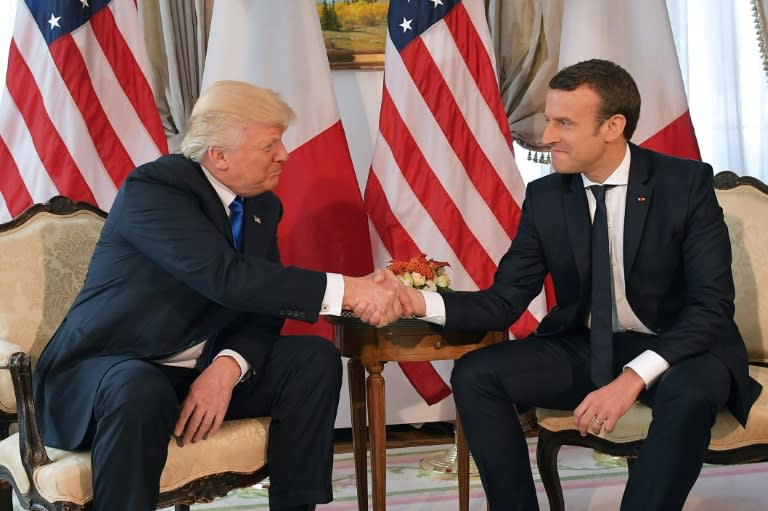Macron and Trump's Syria pledge masks strategy void: analysts

The tough talk of the US and French presidents in vowing a "joint response" in the event of another chemical attack in Syria belies a lack of long-term strategy on the war, analysts believe. The threat of military action by Donald Trump and Emmanuel Macron in a phone call on Tuesday came after the Pentagon said it had seen "activity" at an airfield in Syria "that indicated preparations for possible use of chemical weapons". The White House said the preparations at the Shayrat base were similar to those undertaken by Syrian President Bashar al-Assad's regime before an apparent chemical attack on the rebel-held town of Khan Sheikhun in April that killed at least 87 people. That attack prompted Trump to launch 59 cruise missiles at the base, in the first significant military intervention of his presidency. Four years ago, in August 2013, the United States and France promised to punish Assad's regime after it was accused of killing 1,400 people with sarin gas near Damascus. Then US-president Barack Obama had previously said the attack had crossed the "red line" that he had set as the trigger for US military intervention in the conflict. But Obama changed his mind at the last minute and instead of taking military action, he struck a deal with Russia on dismantling Syria's chemical weapons arsenal -- a deal that international bodies and Assad's opponents say is often violated. French officials and diplomats say Obama's U-turn left a lasting bitterness for France. - 'Red line' is back - And the "red line" episode became a watershed in the Syrian conflict with some observers seeing it as the start of the defeat of the Syrian opposition and paving the way for the regime and its Russian and Iranian allies to make political and military gains. But four years on, the expression has been reprised by both Trump and Macron, albeit in a different context. Trump said before launching air strikes that the Khan Sheikhun attack "crosses many, many lines". When Macron, in office just two weeks, held talks with Russian President Vladimir Putin in Versailles in May he actually used the expression "red line", saying France would strike if chemical weapons were used in Syria, and would act alone if necessary. Then came Macron and Trump's pledge Tuesday of "joint action". Charles Lister, a senior fellow at the Middle East Institute, said the threat would have a limited effect, pointing out that the US air strikes in April were not followed up with any significant change in Washington's approach to Syria. "Limited punitive strikes and strong public statements are not enough to deter a regime that has killed hundreds of thousands of its own people, and they remain insufficient to ward off Russia and Iran, which have more to gain and lose in Syria than the United States," Lister wrote. - 'Willing to strike regime' - Christopher Phillips, Associate Fellow of the Middle East and North Africa programme at the London-based Chatham House think-tank said while the US and French pledge was no "hollow threat", it probably masked another motive. "We've already seen from the Trump administration that they are willing to strike the (Syrian) regime when there are allegations of chemical weapons," he told AFP. "The real question is, 'why are they declaring this now?' We must presume it is more to do with sending a message to Russia and Iran," the Assad regime's two main allies. Trump has accepted an invitation to take part in France's July 14 national holiday celebrations in Paris when the White House said the two leaders will "further build on the strong counter-terrorism cooperation and economic partnership between the two countries". Yet on Syria, it remains to be seen how far the Franco-US cooperation will go. A diplomatic source said France was only informed at the last minute about the US strikes on the Syrian base in April, far too late for it to have taken part even if it had wanted to. Other observers said the expression "red line" was fraught was danger because it could be interpreted by the Syrian regime that anything less than a chemical attack was somehow acceptable. "What about the torture in the regime's jails, the barrel bombs, people under siege?" Middle East specialist Ziad Majed said. Bruno Tertrais, from the Foundation for Strategic Research, said the threat had at least underlined that chemical weapons remain a taboo for the international community. "France sees itself as having a special role in maintaining the taboo on the use of chemical weapons, and Macron has reiterated that," he said.

 Yahoo Finance
Yahoo Finance 